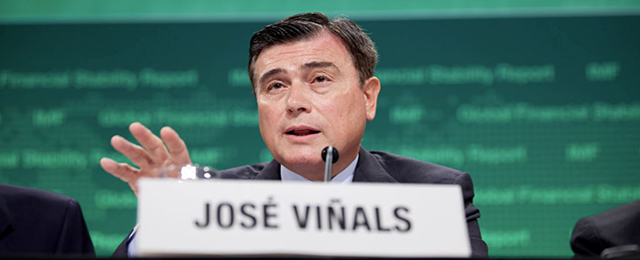To Viñals this is a conundrum:
“How is it possible that the financial markets are so optimistic when the economic news that we have had lately are not so good?”
As a consequence, volatility has dropped around the world–using the IMF models–to levels not seen since 2007, right before the financial crisis struck. One of the answers, according to Viñals is monetary policy.
With their liquidity injections, “central banks have compressed volatility [in the financial markets] in an extraordinary manner”. The former deputy governor of the Bank of Spain explained that “when interest rates and volatility are low, investors take extraordinary risks.”
The critical question is what will happen now. The Federal Reserve will start raising interest rates in approximately one year–perhaps sooner, based on Janet Yellen’s remarks on Tuesday–, and that will make an impact all over the world. Historically, for every 100 basis points (bps) that interest rates go up in the United States, they increase 40 to 70 in advanced economies and 100-150 in the rest of the world.
The IMF forecasts US short-term rates, currently at zero, of 4% in 2018, while long-term rates, now at 2.8%, will reach that year their equilibrium at close to 5%. That would mean a significant tightening of the financial conditions in the next three years, at a time when the Eurozone economy is still in a weak state, and American companies are going thorough a re-leveraging consequence, in part, of the aforementioned monetary relaxation. Further, Viñals remembered that the Eurozone banking sector still has “800 billion in bad loans” that are causing a fall in credit “even in core countries, such as France.”
Viñals summarized his vie when he said that “in Europe, money doesn’t transform into credit that doesn’t transform in growth.” However, the biggest vulnerabilities, according to Viñals, are in the developing world. First, emerging markets’ firms have followed their American counterparts’ example and have “accumulated debt” that has not been used “to expand production, but in financial operations.” This has been particularly clear in China, but it is starting to happen also in Latin America. In the region, Viñals was critical with Brazil for its lack of reforms, and praised Mexico for launching an ambitious economic liberalization. To the IMF director of Monetary and Financial Affairs, Mexico “is an example” even for the European economies.






Be the first to comment on "IMF warns about the “optimism of the financial markets”"